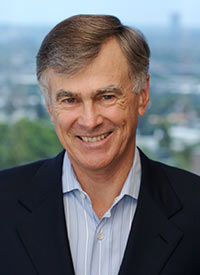Jan 26, 2018
How to Have a More Productive Year by Learning to Set SMARTer Goals
A peek into a Russell Bishop seminar
Russell Bishop, Fortune 500 leadership consultant and educational psychologist, recently led a New Year seminar to help corporate executives plan for their best year yet—in and out of the office. I was fortunate enough to attend the seminar and gained some valuable insight about how leaders set goals.
The intimate conference allowed the leaders to speak openly about their personal and professional hopes and fears. Bishop tailored the seminar to the group’s needs and let the goal setting flow with his guidance.
He left the leaders with six main takeaways for creating a productive year and increasing happiness based on the challenges the leaders expressed. Although you may not run a Fortune 500 company (yet), acting like a leader is the best way to become one.
6 Lessons for Leaders from Russell Bishop on having a more productive year
- Praise your accomplishments, while analyzing your disappointments
It’s essential to take an honest inventory of your past success and failure. Oftentimes, praising accomplishments is harder for people than identifying where they fell short. Bishop explains this is because of negative self-talk (how our self-image creates either positive or negative internal dialogue) that’s been instilled in us.
He gives the example of a grade school spelling test score. When you receive a grade at the top of your spelling test that reads “-6” instead of “44/50”, you’re trained to focus on the negative, what you lost. In actuality, this score is a B+ and something to be proud of. With the “44/50” model you also have something to build off of.
By taking inventory now, we can identify negative self-talk and adapt our goals.
- Choose areas of focus for your goals
To choose an area of focus, Bishop recommends looking at your personal growth, friends, wealth, fun/adventure, service/philanthropy, career, family, and health. He suggests these topics as a starting point for formulating new goals but encourages you to explore other areas in your life where you place great importance such as spirituality or faith.
Once you’ve chosen your areas of focus, it’s time to visualize what you want in each area. What will make you happy and fulfilled?
- Understand the goal symbolizes for you
Now, look at your list of things you want. Try to understand why you want them, and what they symbolize to you. For example, your goal may be to get a 5 percent raise at work. First, figure out why you want this raise: money, acknowledgment, status? Then, determine what these things symbolize to you. You want more money, which really means you want stability or freedom. You want higher status, which really means you want power or pride.
With the experience at the forefront of your mind, it’s time to take a good, hard look at whether these tangibles will actually produce the experience you want. You should also consider whether or not reaching these goals will stunt your experience so severely that it may not be worth it.
Imagine that you have to work overtime five nights a week to get that 5 percent raise that will ensure you have enough money to be free to go on lavish vacations. You’re sacrificing so much freedom to reach your that goal that it may not be worth it.
- Set SMART goals
Once you fully understand the true reasons behind your desires you can set goals, but make sure they’re SMART goals.
Specific—Clear, objective
Measurable—How much, how many?
Attainable—At least an 80% chance of success, not so far-fetched they’ll never happen
Relevant—Achievement matters in critical areas of focus
Time-bound—You know when it’s due
By keeping your goals SMART, you are setting yourself up for success and making your goals reviewable. Often, people get lost in trying to decide the actual goal and they flounder between getting a 5 percent raise or finding a new higher paying job altogether.
Bishop says there’s no way to predict what will make you happier in the future, but one thing that definitely won’t make you happier is doing nothing. You need to start moving in any direction and the best part about goals is they’re adaptable. If something isn’t serving you as it should change it.
- Positive self-talk
Bishop says as soon as you give your brain a focus it filters through the world through that focus. If you chose to focus on something positive, you’ll see more positive things in life. The same goes for negativity. If you are focused on feeling bad and you tell yourself, “Don’t feel bad,” your brain will only focus on “feel bad.” This is why your self-talk must always be positive.
As a psychologist, he swears by affirmations. By creating positive affirmations about feelings and not actions he truly believes you can build habits. Instead of saying, “I love to floss every day,” he repeats, “I love the healthy way my mouth and gums feel when I floss every day.”
With repetition and a focus on physical feelings, you will genuinely convince yourself. The best part, Bishop says, is that you should never do the action if you don’t feel like it. Only floss when you feel like have a healthy mouth. This will reinforce the validity of your affirmations.
Another key part of self-talk is finding paradigms that you’ve come to believe are true. While some paradigms can be expansive (“I can do anything I put my mind to!”) others can be limiting (“I need other people’s approval.”) Bishops says there’s no room your worldview for limiting paradigms and one of the most helpful things you can do is to rid yourself of these through affirmations.
- Review your progress at least monthly
Check-in, whether it’s with an accountability partner or just yourself. You need to be monitoring your progress and reminding yourself of your focus. Some people avoid monthly check-ins because they’ve forgotten their positive self-talk and see this as a time to be critical of any missteps. While being honest about disappointments is healthy, take this time to praise the small accomplishments.
Jessica Welch is the Content Marketing Associate at BigSpeak Speakers Bureau, holding a Bachelor’s Degree in English Literature and Anthropology from California Polytechnic State University, San Luis Obispo. Her business thought articles often appear on Business 2 Community, Born 2 Invest, and YF Entrepreneurs.
Speaker
Tags

 Russell Bishop
Russell Bishop